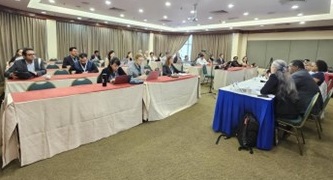UN Climate Change News, 24 November 2023 - During Asia-Pacific Climate Week 2023, UN Climate Change convened regional Party and non-Party stakeholders to discuss implementation of the enhanced transparency framework (ETF). Country representatives and experts from various fields underscored the need for collaboration across sectors and nations, discussing the complex interplay of policy, practice and communications in global efforts to achieve the goals of the Paris Agreement.
The exchange stressed the need for stronger multi-stakeholder collaboration and the inclusion of youth, local communities, research and academia, business and media in climate transparency work.
Donald Cooper, Director of the UN Climate Change Transparency Division, emphasized that all stakeholders can contribute to enhancing the management of environmental issues by governments.
"If you are an industry representative, a university representative, or a cinema-goers' representative, the UNFCCC process welcomes everybody. And if you do not see your place, create one. The key is to find the most effective way of getting your point through to those who make decisions on behalf of you and your constituents," Cooper said.

Gearing up for ETF implementation
The ETF exchange was organised as part of the #Together4Transparency initiative on the heels of ETF Dialogues held this year in Africa and Latin America and the Caribbean.
The UNFCCC Transparency Division presented the key components, timelines, tools and support available for countries to navigate the transition to the ETF and the development of their first Biennial Transparency Reports (BTRs) due by the end of 2024.
International expert reviewers Alexander Zahar from Australia, Ridhima Sud from India and Mahendra Kumar from Marshall Islands provided insights into their experiences as technical experts in the current reporting and review arrangements under the Convention and Kyoto Protocol, including country-specific challenges and successes in implementing climate transparency measures.
Discussing preparations for the ETF, Anura Wijayathunga from Sri Lanka, Jason Paniu from Papua New Guinea, Naoki Matsuo from Japan and Traute Köther from Austria shared their experiences in climate-related activities and the challenges they face in data collection, reporting and policy implementation.
They emphasized the importance of producing reports not just for compliance but to improve national policies and accountability, highlighting the need for both top-down and bottom-up approaches in climate action - from educational initiatives that engage the whole of society to government-level strategies.
With youth, for youth
Anisa Abibulloeva from Tajikistan, a youth climate delegate, stressed the importance of youth and civil society engagement in the climate transparency process. She recounted her unexpected introduction to the ETF and underscored the need for more accessible, understandable information for young people, particularly in developing countries.
Abibulloeva highlighted the potential of the ETF as a tool for holding governments accountable and ensuring intergenerational equity, highlighting the need for youth to be meaningfully involved as specialists in climate action and transparency, not just as symbolic participants.
A panel discussion with civil society representatives explored the roles of business, subnational governments and academia in climate action. Dennis Wan from CDP, Jukhee Hong from the ASEAN Business Advisory Council, Rizky Rachmawati from the Indonesian Riau province, Samantha Thian from the Singaporean NGO Seastainable and Zulfaquar Saaidi from Technology University of Malaysia joined the discussion.
They underlined the growing awareness and willingness to act from all sides of society, in particular the business community, in the context of Environmental, Social and Governance reporting. The panel also shared examples of contributions by subnational governments and academic institutions to driving local and regional climate initiatives.
Better communications for stronger action
The last panel delved into the critical role of media in climate communications and the challenges of ensuring transparent reporting. Biena Magbitang from Climate Tracker, Ushar Daniele also from Climate Tracker and freelance producer for Al Jazeera Malaysia, and Mia Pepper from Publish What You Pay Australia emphasized the importance of translating complex climate data into more accessible and understandable information that resonates with the public, as well as the need for journalists to differentiate factual reporting from promotional content.
See the #Together4Transparency programme of events at COP28.






